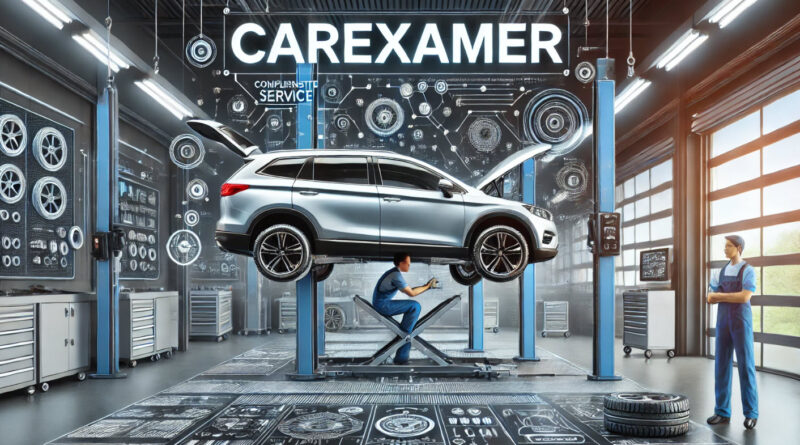What is a Car Service? A Comprehensive Car Service Checklist
Understanding the importance of a car service and knowing what checks are typically included can help you keep your car running smoothly and avoid costly repairs down the road. Maintaining your vehicle in peak condition requires regular servicing. But what exactly is a car service, and what does it involve?
What is a Car Service?
A car service is a routine maintenance check-up that is typically recommended by car manufacturers to ensure that your vehicle remains in good working order. Unlike an MOT, which is a legal requirement in many countries and focuses on the safety aspects of a vehicle, a car service is more comprehensive and includes both safety checks and performance-related maintenance tasks.
Regular servicing helps to prolong the life of your vehicle, improve fuel efficiency, maintain engine performance, and ensure your car is safe to drive. Depending on the type of service (interim, full, or major), different checks and tasks will be carried out.
Types of Car Services:
These are more heard in aftermarket marketing tricks to make service cheaper for average consumer. In main dealer world these terminologies don’t exist its weather interim or full and major means same thing. Manufacturers have service schedule.
- Interim Service:
- Recommended every 6 months or 6,000 miles, whichever comes first.
- Includes basic checks and changes, such as oil and filter changes, checks on lights, brakes, and tires, and topping up fluids.
- Full Service:
- Recommended every 12 months or 12,000 miles, whichever comes first.
- Includes everything in an interim service plus additional checks such as inspection of the engine, electrical components, and the cooling system.
- Major Service:
- Recommended every 24 months or 24,000 miles, whichever comes first.
- A comprehensive service that includes all the checks from a full service plus additional replacements like spark plugs, air filters, and brake fluid.
Car Service Checklist
A car service checklist typically includes the following key areas:
- Engine Oil and Filter Change:
- Replace the engine oil and filter to ensure smooth engine operation and prolong engine life.
- Brakes:
- Inspect the brake pads, discs, and fluid levels. Worn brake pads or low fluid levels can lead to decreased braking efficiency, making this a critical safety check.
- Tires:
- Check the condition, tread depth, and pressure of all tires, including the spare. Properly maintained tires improve fuel efficiency and ensure safe handling.
- Lights:
- Inspect all lights, including headlights, brake lights, indicators, and interior lights, to ensure they are functioning correctly.
- Battery:
- Check the battery’s condition, including the terminals, and ensure it is charging correctly.
- Steering and Suspension:
- Inspect the steering system and suspension components for wear and tear, ensuring the car handles safely and comfortably.
- Exhaust System:
- Inspect the exhaust system for leaks or damage, which could affect vehicle performance and emissions.
- Fluid Levels:
- Check and top up all essential fluids, including coolant, brake fluid, power steering fluid, and windshield washer fluid.
- Wipers and Washers:
- Ensure the wiper blades are in good condition and that the washer fluid is topped up for clear visibility.
- Air and Cabin Filters:
- Replace the engine air filter and cabin filter to ensure clean airflow to the engine and interior of the vehicle.
- Belts and Hoses:
- Inspect the condition of the drive belts and hoses for signs of wear, cracking, or leaks.
- Drive System:
- Check the condition of the drive shafts, boots, and joints for wear and potential failure.
- Spark Plugs:
- Inspect and replace spark plugs if necessary, to ensure efficient engine performance.
- Cooling System:
- Inspect the radiator, coolant levels, and hoses to prevent the engine from overheating.
- Transmission Fluid:
- Check the transmission fluid level and condition to ensure smooth gear changes.
Why Regular Car Servicing is Important
Regular car servicing is vital to keep your car running efficiently and safely. It helps prevent unexpected breakdowns, ensures your car is performing optimally, and can even increase the resale value of your vehicle. Additionally, a well-maintained car is more fuel-efficient, reducing the overall cost of ownership.
Ignoring regular servicing can lead to minor issues becoming major, more expensive repairs. For example, failing to change the oil regularly can lead to engine damage, while neglecting brake inspections can result in reduced braking efficiency, posing a significant safety risk.
Summary
A car service is an essential part of vehicle maintenance, involving a thorough inspection and servicing of various components to ensure your car remains in top condition. By following the car service checklist and adhering to the recommended service intervals, you can enjoy peace of mind knowing that your vehicle is safe, reliable, and performing at its best. Regular servicing not only prolongs the life of your car but also helps you avoid costly repairs and maintain your car’s value over time.
Buying a used VW. Buying used vauxhall, BMW, Jaguar, Ford, Volvo, Range rover, Bentley, Aston Martin, Porsche, Ferrari, Lamborghini, Maserati, Hyundai, Tesla, Honda, Pagani

